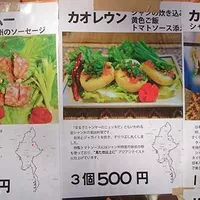ミャンマー の お祭り ...(n4)
みゃんまー||おまつり|
Feste in Myanmar ... (n4)
Festival in Myanmar ...(n4)
Festivales de Myanmar ... (n4)
Festivals du Myanmar ... (n4)
미얀마 축제 ... (n4)
Myanmar festivals ... (n4)
Festiwale w Birmie ...(n4)
Festivais de Myanmar ... (n4)
Фестиваль в Мьянме ...(n4)
缅甸的节日......(n4)
缅甸节日 ...(n4)
缅甸节日 ...(n4)
東京 の 増上寺 (ぞうじょうじ) と 言う お 寺 に 行って きました。
とうきょう||ぞう じょう てら|ぞう じょうじ||いう||てら||おこなって|
||Zojoji||||||||
||Templo Zojoji||||||||
Ich habe den Zojoji-Tempel in Tokio besucht.
I went to a temple called Zojoji in Tokyo.
Visité el templo Zojoji en Tokio.
Я пошел в храм под названием Зодзёдзи в Токио.
我去了东京的一座叫增上寺的寺庙。
我去了東京的一座叫增上寺的寺廟。
たくさんの 人 が 来ています。
|じん||きて います
Es kommen viele Menschen.
Many people are coming.
Va a venir mucha gente.
Приходит много людей.
很多人都来了。
很多人都來了。
今日 は ここ で ミャンマー の 祭り が 行われて いました。
きょう||||みゃんまー||まつり||おこなわれて|
||||Birmania||||se celebró|
Heute fand hier ein Myanmar-Festival statt.
A Myanmar festival was held here today.
Hoy se ha celebrado aquí un festival de Myanmar.
Сегодня здесь проходил фестиваль в Мьянме.
今天在这里举行缅甸节日。
今天這裡正在舉行緬甸節慶。
ミャンマー の 大使館 も ミャンマー の 文化 を 日本 人 に 知って もらおう と 色々な 物 を 紹介 していました。
みゃんまー||たいし かん||みゃんまー||ぶんか||にっぽん|じん||しって|||いろいろな|ぶつ||しょうかい|して いました
||Embajada||||cultura de Myanmar||||||||||||
Der Taishikan aus Myanmar stellte den Japanern auch verschiedene Dinge vor, um die Kultur Myanmars kennenzulernen.
The Myanmar embassy also introduced various things to Japanese people to know about Myanmar culture.
El Taishikan de Myanmar también presentó varias cosas a los japoneses para ayudarles a entender la cultura de Myanmar.
Myanmar Taishi также познакомил японцев с различными вещами о культуре Мьянмы.
缅甸太史馆还向日本人介绍了各种东西,让日本人了解缅甸的文化。
ミャンマー の お 酒 も 紹介 していました。
みゃんまー|||さけ||しょうかい|して いました
Auch in Myanmar wurde Schnaps eingeführt.
He also introduced Myanmar's alcohol.
También se introdujo el licor de Myanmar.
Он также представил мьянманское сакэ.
他还介绍了缅甸的缘故。
他們也介紹了緬甸的酒精飲料。
とても 強い お 酒 でした。
|つよい||さけ|
It was a very strong drink.
Era una bebida muy fuerte.
Era uma bebida muito forte.
这是一种非常烈的饮料。
這是一種非常烈的飲料。
かわいい です ね。
It's cute, isn't it.
Lindo, ¿no?
可爱的。
ミャンマー の 伝統 衣装 を 着ています。
みゃんまー||でんとう|いしょう||きて います
||Tradición|Ropa tradicional||
They are wearing traditional Myanmar dress.
Llevo un premio Myanmar Dong Tung Tung.
Estou a usar um prémio Myanmar Dong Tung Tung.
Myanmar Dong Tung Tung Ödülü takıyorum.
我穿着缅甸传统服饰。
彼女 達 が いる と 、会場 が 明るく なります。
かのじょ|さとる||||かいじょう||あかるく|
|||||lugar del evento||más alegre|
Der Veranstaltungsort erhellt sich, wenn sie dort sind.
The venue brightens up when they're there.
Su presencia ilumina el recinto.
Leur présence illumine la salle.
그녀들이 있으면, 장소가 밝아진다.
Onların varlığı mekanı aydınlatıyor.
当他们出现时,场地就会变得明亮起来。
他們一到,場地就變得明亮起來。
ミャンマー の 有名な 歌手 も 来ていました。
みゃんまー||ゆうめいな|かしゅ||きて いました
A famous singer from Myanmar was also there.
También asistieron famosos cantantes de Myanmar.
Törende ünlü Myanmarlı şarkıcılar da hazır bulundu.
一位来自缅甸的著名歌手也在场。
緬甸的著名歌手也來了。
日本 人 より ミャンマー 人 の 方 が 嬉し そうでした。
にっぽん|じん||みゃんまー|じん||かた||うれし|そう でした
Die Menschen in Myanmar schienen glücklicher zu sein als die Japaner.
The Myanmar people seemed happier than the Japanese.
Los habitantes de Myanmar parecían más felices que los japoneses.
일본 사람보다 미얀마인이 더 좋아하는 것 같았다.
Os habitantes de Myanmar parecem mais felizes do que os japoneses.
Жители Мьянмы казались более счастливыми, чем японцы.
Myanmar halkı Japonlardan daha mutlu görünüyordu.
缅甸人民似乎比日本人更幸福。
緬甸人民似乎比日本人更幸福。
おなか が すいた ので 、もちろん ミャンマー 料理 を 頂きます。
|||||みゃんまー|りょうり||いただきます
I'm hungry, so of course I'll have Myanmar food.
배가 고팠으니 당연히 미얀마 요리를 먹는다.
我饿了,当然要吃缅甸菜了。
我餓了,當然要吃點緬甸菜了。
美味し そうな 食べ物 が たくさん ある ので どれ に するか なやみます。
おいし|そう な|たべもの|||||||する か|
There are a lot of delicious-looking foods, so I'm worried about which one to choose.
Hay tantos alimentos sabrosos que es difícil decidir cuál elegir.
Есть много вкусных на вид продуктов, поэтому я беспокоюсь о том, какой из них выбрать.
O kadar çok lezzetli yiyecek var ki hangisini seçeceğinize karar vermek zor.
看起来好吃的食物有很多,所以我很烦恼该选哪一种。
看起來很美味的食物太多了,我很難決定要嘗試哪一種。
ご飯 と めん を 買いました。
ごはん||||かいました
I bought rice and noodles.
밥과 면을 샀습니다.
我买了米饭和面条。
ほとんど 炭水化物 だけ です ね。
|たんすいかぶつ|||
|Carbohidratos casi exclusivamente|||
It's mostly just carbohydrates.
Casi sólo unos pocos hidrocarburos.
거의 물만 있는 것 같네요.
В основном это просто тансуйбуцу.
Neredeyse sadece birkaç hidrokarbon.
它大多只是一个tansuibutsu。
它主要只是碳水化合物。
とても おいしかった です。
It was very delicious.
这非常好吃。
今回 祭り が 行われた お 寺 は 、東京 タワー の 近く に あります。
こんかい|まつり||おこなわれた||てら||とうきょう|たわー||ちかく||
||||||||Torre de Tokio||||
Der Tempel, in dem das Festival diesmal stattfand, befindet sich in der Nähe des Tokyo Tower.
The temple where the festival was held this time is near Tokyo Tower.
El templo donde se celebró el festival está situado cerca de la Torre de Tokio.
这次举办祭典的寺庙位于东京铁塔附近。
舉辦這個節慶的寺廟位於東京鐵塔附近。
日本 の 古い 文化 と 新しい 文化 と いっしょに 写真 を とれる お すすめ の 場所 です。
にっぽん||ふるい|ぶんか||あたらしい|ぶんか|||しゃしん||||||ばしょ|
Es ist ein empfehlenswerter Ort, an dem Sie Fotos mit japanischer alter und neuer Kultur machen können.
It is a recommended place where you can take pictures with Japanese old culture and new culture.
Un lugar estupendo para fotografiar juntos la antigua y la nueva cultura japonesa.
Um ótimo local para tirar fotografias da antiga e da nova cultura japonesa em conjunto.
Это рекомендуемое место, где вы можете сфотографироваться со старой и новой культурой Японии.
是一个可以拍摄日本旧文化和新文化的推荐地点。

